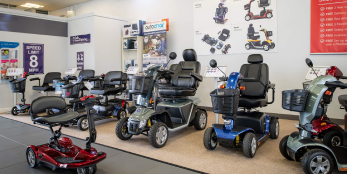Table of contents
What Mobility Scooters Can Fit in the Trunk of a Car?
Mobility scooters are an essential tool for individuals who need help getting around but want to maintain their independence. One of the most common questions among shoppers is: What mobility scooters can fit in the trunk of a car? Whether you're running errands, heading to a doctor’s appointment, or planning a road trip, a trunk-compatible scooter can be a game changer.
In this article, we’ll cover the types of scooters that fit in car trunks, key features to look for, and highlight a few top-rated models to consider. We’ll also give you some practical tips to ensure a smooth and successful transport experience.
Why Trunk Compatibility Matters
Mobility scooters that can fit in a car trunk are ideal for users who travel frequently or rely on family or caregivers for transportation. Not all scooters are designed to be portable, and traditional full-size models can be heavy, bulky, and difficult to load into a vehicle without a ramp or lift.
Portable and travel scooters, however, are made specifically with trunk compatibility in mind. These models either fold, disassemble, or collapse into compact parts, making them easier to lift and store.
🛵 Types of Mobility Scooters That Can Fit in Car Trunks
1. Folding Mobility Scooters
Folding scooters collapse in one piece, often with the press of a button or quick manual fold. These are ideal for users who want a hassle-free experience without the need to take apart multiple components.
Pros:
Quick and easy to fold
No loose parts
Often lightweight (under 60 lbs)
Cons:
Smaller battery range
Lower weight capacity
Less suspension or comfort features
Examples:
Pride iRide2
2. Disassembling Mobility Scooters
Disassembling scooters come apart into several smaller pieces—usually the seat, battery, tiller, and base. This makes them easier to lift piece by piece and store in tight trunk spaces.
Pros:
Larger models can still be trunk-compatible
Often have more comfort features than folding scooters
Can support higher weight capacities
Cons:
Takes more time to break down and reassemble
More parts to manage
Examples:
Go-Go Elite Traveller by Pride Mobility
Drive Medical Scout
3. Ultra-Lightweight Scooters
Ultra-light scooters are often made from aluminum or lightweight composites and weigh between 35 and 50 pounds. These are ideal for users who travel often and need a scooter that can be lifted without assistance.
Pros:
Easy to lift in and out of a trunk
Often foldable or collapsible
Airline-approved battery options
Cons:
Typically smaller in size
Lower weight capacity (usually up to 250 lbs)
Examples:
Feather Scooter
eFoldi Lite
🔑 Key Features to Consider for Trunk Fit
Choosing a mobility scooter that fits in the trunk of your car requires more than just looking at the overall size. There are several key features that can affect portability, usability, and overall satisfaction. Below are the most important features to evaluate before making a purchase:
✅ 1. Weight of the Scooter (or Heaviest Piece)
The total weight of the scooter is one of the most important factors, especially if you or a caregiver will be lifting it regularly. Scooters that weigh over 60 pounds fully assembled can be difficult to handle without assistance.
What to Look For:
Full scooter weight under 60 lbs (ideal for lifting as one unit)
Heaviest disassembled piece under 40 lbs
Removable battery or seat to reduce weight
Why It Matters:
Even if a scooter technically fits in your trunk, it may not be practical if it's too heavy to lift. Lightweight models improve user independence and ease of transport.
✅ 2. Folded or Disassembled Dimensions
Size is just as critical as weight. Trunk-compatible scooters should fit into the available cargo space in your vehicle—length, width, and height all matter.
What to Look For:
Folded or collapsed dimensions listed in the product specs
Ability to disassemble into multiple smaller components
Fold-flat tiller or removable armrests for a more compact profile
Why It Matters:
Measure your trunk opening and available floor space (with or without folded seats) and compare those to the scooter’s storage size. Don’t forget to allow extra room for groceries, luggage, or other essentials you may be carrying.
✅ 3. Folding or Disassembly Mechanism
How easily a scooter folds or comes apart makes a huge difference in convenience, especially for users with limited strength or dexterity.
What to Look For:
One-step or automatic folding mechanisms
Tool-free disassembly
Intuitive reassembly process
Why It Matters:
The simpler the breakdown and setup process, the more likely you’ll use your scooter regularly. This is especially important for those traveling solo or relying on caregivers for assistance.
✅ 4. Battery Type & Placement
The type, weight, and position of the battery can influence both airline travel approval and ease of transport. Many modern scooters now feature removable lithium-ion batteries that are lighter and safer.
What to Look For:
Lithium-ion batteries under 300Wh (airline-approved)
Easily removable battery pack
Secure but accessible battery compartment
Why It Matters:
A scooter with a removable battery can be lightened for lifting, and lithium batteries allow for better travel flexibility (including air travel). Just be sure to carry spares in your carry-on if you're flying.
✅ 5. Durability & Frame Material
Lightweight doesn’t have to mean flimsy. Look for scooters made from high-quality, durable materials that balance portability with strength.
What to Look For:
Aluminum or carbon fiber frame (for lightness and durability)
Anti-corrosive coating for humid environments
Reinforced components around hinges or folding points
Why It Matters:
Frequent lifting and folding can cause stress on frame joints, especially if they’re made from plastic or low-grade metal. A well-built frame ensures your scooter stays dependable over time.
✅ 6. Comfort Features That Don’t Add Bulk
Trunk-compatible scooters often compromise on comfort to save space and weight, but some models are designed to strike a better balance.
What to Look For:
Padded adjustable seat and backrest
Adjustable tiller height and angle
Suspension or anti-tip wheels (on some models)
Why It Matters:
If you plan to use the scooter for more than just occasional outings, comfort matters. A trunk-sized scooter with ergonomic seating and good maneuverability can enhance your daily experience without sacrificing portability.
✅ 7. Ease of Steering & Maneuverability
Especially for tight parking lots or crowded areas, scooters with a tight turning radius and responsive controls are more user-friendly.
What to Look For:
3-wheel design for tighter turning radius (ideal for indoor or tight spaces)
Delta tiller or ergonomic handlebars
Anti-tip safety wheels
Why It Matters:
Even the best trunk-sized scooter can become frustrating if it’s hard to steer in small spaces. Smooth handling is essential when navigating airports, shops, or parking lots.
✅ 8. Storage & Accessories
Compact scooters often have limited storage, so look for models that offer clever add-ons without adding bulk.
What to Look For:
Under-seat baskets or rear storage pouches
USB ports for charging
Compatible with cane holders, cup holders, and travel bags
Why It Matters:
Functional accessories can turn a basic scooter into a fully travel-ready companion—while still being small enough to store in your vehicle.
✅ 9. Tool-Free Setup
If a scooter requires special tools to assemble or break down, it’s likely not designed with trunk transport in mind.
What to Look For:
Quick-release levers
Snap-on battery or tiller locks
Minimal loose parts
Why It Matters:
Ease of setup and breakdown encourages use. Tool-free designs reduce frustration and save time when loading and unloading the scooter from your trunk.
🚗 Best Car Trunks for Mobility Scooters
Not all car trunks are created equal. Compact cars may have difficulty fitting a scooter without folding the rear seats. Mid-size sedans, SUVs, and hatchbacks typically offer better storage space.
SUVs & Crossovers:
Honda CR-V
Toyota RAV4
Ford Escape
Sedans (with fold-down seats):
Toyota Camry
Honda Accord
Hyundai Sonata
Hatchbacks:
Kia Soul
Mazda3 Hatchback
Subaru Impreza
🚗 Tips for Loading a Scooter Into a Car Trunk
Even with a lightweight or travel-sized mobility scooter, getting it in and out of a car trunk can be physically demanding—especially if you travel frequently or manage this process on your own. Fortunately, there are several smart solutions that make loading easier and safer.
1. Use a Lightweight Portable Ramp
A foldable or telescoping ramp is one of the most accessible and affordable tools for loading a scooter into a trunk, SUV, or hatchback.
Benefits:
Easy to store in your trunk when not in use
No lifting required—simply roll the scooter up or down
Great for users with back or joint issues
What to Look For:
Non-slip surface for safety
Lightweight aluminum construction
Minimum length of 5 to 6 feet for lower incline
Foldable or telescoping design for compact storage
Tip: Ensure your vehicle has a low enough loading height. Ramps work best with SUVs and hatchbacks with a flat cargo entry.
2. Consider a Portable Scooter Lift
For those who find lifting or pushing difficult—or are transporting a heavier scooter—a portable electric or manual lift can be a game-changer. These compact devices are designed to help raise and lower scooters into car trunks or SUV cargo areas without physical strain.
Types of Portable Lifts:
Electric hoists that attach to your vehicle’s frame or sit freestanding
Manual lifts that use leverage and pulleys
Trunk-mounted swing lifts for sedans and hatchbacks
Pros:
Reduces physical effort to almost zero
Ideal for caregivers or seniors with limited mobility
Some models are foldable and can travel with you
Cons:
Higher upfront cost
May require installation or setup
Some models are vehicle-specific
Tip: If you frequently travel with your scooter, investing in a lift system can preserve your back, reduce risk of injury, and increase independence.
3. Disassemble the Scooter First
If your scooter is designed to come apart, always remove the heaviest components first. Most scooters disassemble into:
The base (largest/heaviest part)
The seat
The battery pack
The tiller (steering column)
Why It Helps:
Reduces the weight of individual components
Makes it easier to lift piece-by-piece
Safer and more manageable, especially for solo users
Tip: Place heavier parts closer to the trunk opening to avoid straining when reaching in.
4. Use Protective Padding in Your Trunk
To prevent scratches or damage to your vehicle’s interior—or your scooter—line the trunk with:
A folded moving blanket
A soft yoga mat or foam padding
A non-slip rubber mat for added grip
Benefits:
Protects both your vehicle and scooter from dings and scuffs
Helps keep parts in place during transit
Makes sliding heavier components easier without damaging the surface
Tip: Secure smaller items like battery chargers or baskets in reusable storage bins to keep them organized and prevent shifting.
5. Keep a Storage Bag or Travel Cover Handy
Many folding or travel scooters come with a custom carrying bag or protective cover. These are especially useful when transporting multiple pieces or protecting against dirt and moisture.
Advantages:
Easier to grip and lift parts with handles
Keeps scooter clean during loading/unloading
Adds a layer of protection during transit
Tip: Choose a bag that is padded and has reinforced seams if you transport your scooter frequently.
6. Practice Makes Perfect
Don’t wait until your first big outing or vacation to try loading your scooter. Take time at home to practice disassembly, lifting, and arranging parts in your trunk.
Try This:
Time yourself loading and unloading
Experiment with different trunk arrangements
Involve caregivers or travel companions to find the easiest method
Why It Matters:
Practicing ahead of time builds confidence, reduces stress on travel day, and helps identify any unexpected challenges before they become a real issue.
7. Ask for Help When Needed
Even lightweight scooters can be awkward to handle. Don’t hesitate to ask a caregiver, friend, or family member for assistance if needed—especially with heavier parts.
You can also:
Request help from airport personnel or hotel staff when traveling
Ask your scooter dealer about in-home demonstrations or loading assistance
Look into vehicle customization options (e.g., trunk lifts or vehicle ramps)
Tip: Mobility is about independence, but safety always comes first.
By using ramps, lifts, and smart packing strategies, transporting your mobility scooter doesn’t have to be a challenge. The right combination of equipment and preparation ensures you can bring your scooter wherever life takes you—without risking injury or frustration.
❓ FAQs About Mobility Scooters and Trunk Fit
Can I fit a mobility scooter in a compact car?
Yes, but it depends on the scooter model. Foldable or ultra-light scooters usually work best for compact vehicles.
For heavier full-size scooters, yes. But most trunk-compatible scooters are designed to be loaded by hand, without external carriers or lifts.
For heavier full-size scooters, yes. But most trunk-compatible scooters are designed to be loaded by hand, without external carriers or lifts
Are trunk-friendly scooters durable enough for daily use?
Absolutely. Many travel scooters are designed with durable frames and quality components for everyday use—just be sure to check the weight capacity and terrain limitations.
Can I bring a trunk-friendly scooter on a plane?
Many models that fit in a trunk are also airline-approved. Look for lithium-ion batteries under 300Wh and confirm with your airline before travel.
Final Thoughts
Choosing a mobility scooter that fits in your car trunk opens the door to greater independence, convenience, and travel freedom. Whether you opt for a folding model or one that disassembles into manageable parts, there are plenty of great options available to meet your needs.
Before purchasing, always double-check your vehicle’s trunk dimensions, confirm battery regulations, and think through how often you’ll need to load or unload your scooter. With the right choice, you’ll be able to go where you want—when you want—without worrying about how to transport your scooter.
If you need personalized recommendations, Suncoast Mobility is here to help. Contact us to learn more about travel-friendly scooters or to schedule a demo. We’ll help you find the perfect fit for your trunk and your lifestyle.








